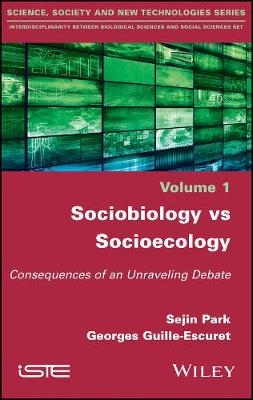
Sociobiology vs Socioecology
ISTE Ltd and John Wiley & Sons Inc (Verlag)
978-1-78630-135-2 (ISBN)
As a theory, sociobiology is opposed to socio-ecology, a discipline hampered since its birth. The indictment of the ideological intentions of the first has obscured the notion that the growing domination of the image of the “selfish gene” has obstructed the necessary rise of the second.
For 40 years, a terrible force of inertia has thus frozen the global analysis of socio-ecological interactions outside the theoretical bias externally imposed on social sciences by so-called “behavioral ecology”, which amounts to a simple emanation of sociobiology. This book summarizes the methodological abuses and the illusory legitimations of a school whose sterility can no longer be concealed, but which is preparing to reinvent itself by cynically replacing its faltering laws by hijacking the recent advances in epigenetics. The authors shed light on unjustly sacrificed paths in the study of socio-ecological interactions.
Sejin Park, Seoul National University, South Korea. Georges Guille-Escuret, CNRS, France.
Introduction ix
Chapter 1 From Altruism to Sociobiology: Historical and Epistemological Summary 1
1.1 Introduction 1
1.2 The “social Darwinism” of the 19th Century 2
1.3 Reconquest of the quest: 20th Century social neo-Darwinism 9
1.4 Expansion, disintegration signs and recent defections 18
1.5 Missing or extra squares on the chessboard 23
1.5.1 Wilson's initial epistemological traffic: sociobiology and behavioral ecology 24
1.5.2 Communicating evasiveness: behavior, altruism, society, culture 26
1.5.3 Cut-short dispute and perverted controversy 34
1.6 Temporary theory and permanent fantasy: will sociobiology soon be superseded? 38
Chapter 2 The Illusory Endorsement of Insects: Omissions and Arbitrary Choices 41
2.1 Entomologic stronghold and the place of social insects 41
2.1.1 Natural advantages of social entomology 42
2.1.2 A rival society, accessible to experimentation 44
2.1.3 The extent of “societies” in insects 46
2.2 Organicism, superorganism and monospecific society 48
2.3 The beacon built by Wilson 50
2.3.1 Classification and social ranks 51
2.3.2 The enumeration of social births 54
2.4 Missing questions 56
2.5 Stigmergy versus haplodiploidy: a “choice of society”? 61
2.5.1 Stigmergy: from problematic to theory 62
2.5.2 Socioecological stigmergy versus sociobiological haplodiploidy 65
2.6 Subsequently emerged information 68
2.6.1 Thrips 69
2.6.2 Aphids 71
2.6.3 Termites, again 72
2.7 Polyethism, polyphenism and monomania 74
Chapter 3 Gray Langur Society and Chimpanzee Culture 77
3.1 Gray langur society shrunk to infanticide 78
3.1.1 Practical and theoretical parameters of the “case” 79
3.1.2 Strategic obsession and fact selection 82
3.1.3 From scorned comparison to repressed anthropology 86
3.2 Culture and chimpanzees 91
3.2.1 Bric-a-brac and difference in degrees 91
3.2.2 Distinction criterion and the surprise from chimpanzees 95
3.3 Non-natural selection of comparisons 100
Chapter 4 On the Specificity of Human Sociality 103
4.1 Logic of inbreeding avoidance in non-human primates 104
4.1.1 Facts 104
4.1.2 Westermarck effect: difficulties in the face of simian facts 107
4.1.3 Sexual avoidance as a social fact 110
4.2 Logic of the incest prohibition in humans 116
4.2.1 Kinship: a form of intersubjectivity specific to humans 117
4.2.2 Birth is a metaphor, and also incest 120
4.2.3 Incest prohibition as a struggle for recognition 125
4.3 Regarding sexual division of labor and food sharing 129
4.3.1 Sexual division of labor as struggle for recognition 130
4.3.2 Sharing and recognition 133
4.3.3 Failure of sociobiological explanations 135
4.4 Outline of a socioecological explanation 142
4.4.1 Forgotten issue: ownership 143
4.4.2 Ecological efficacy of the hunting-gathering regime 147
4.4.3 Evolutionary pertinence of the hunting-gathering regime 151
Chapter 5 The Sociobiological Force of Inertia and Socioecology Challenges: Conclusion 157
5.1 The meltdown of the debate 158
5.1.1 The disastrous confusion between the modes of discussion 159
5.1.2 The failure of sociobiology, demonstrated by Wilson 161
5.2 The epistemological obstacle behind the force of inertia 162
5.2.1 Ariadne's thread against history 164
5.2.2 Beanbag against interdependence 166
5.2.3 “All other things being equal” 168
5.2.4 Diagnosis on the force of inertia of sociobiology 169
5.3 Interaction, ecology and social sciences 171
5.4 Mutual respect, a condition of interdisciplinarity 174
5.5 Conclusion 176
Bibliography 179
Index 195
| Erscheinungsdatum | 01.06.2017 |
|---|---|
| Verlagsort | London |
| Sprache | englisch |
| Maße | 152 x 239 mm |
| Gewicht | 476 g |
| Themenwelt | Geisteswissenschaften ► Archäologie |
| Sozialwissenschaften ► Ethnologie ► Völkerkunde (Naturvölker) | |
| Sozialwissenschaften ► Soziologie ► Mikrosoziologie | |
| ISBN-10 | 1-78630-135-0 / 1786301350 |
| ISBN-13 | 978-1-78630-135-2 / 9781786301352 |
| Zustand | Neuware |
| Haben Sie eine Frage zum Produkt? |
aus dem Bereich


